Synology DS415+ Review: DSM on Intel Rangeley
by Ganesh T S on October 30, 2014 7:30 AM EST- Posted in
- NAS
- Storage
- Intel
- Synology
- Silvermont
- Enterprise
- Rangeley
Encryption Support Evaluation
Consumers looking for encryption capabilities can opt to encrypt a iSCSI share with TrueCrypt or some in-built encryption mechanism in the client OS. However, if requirements dictate that the data must be shared across multiple users / computers, relying on encryption in the NAS is the best way to move forward. Most NAS vendors use the industry-standard 256-bit AES encryption algorithm. One approach is to encrypt only a particular shared folder while the other approach is to encrypt the full volume. Synology supports only folder-level encryption for now in DSM.
On the hardware side, encryption support can be in the form of specialized hardware blocks in the SoC (common in ARM / PowerPC based NAS units). In x86-based systems, accelerated encryption support is dependent on whether the AES-NI instruction is available on the host CPU. One of the most attractive features of the Intel Rangeley platform / Silvermont cores is full hardware acceleration for all essential cryptography functions. The results, as you can see below, are consistent across all evaluated scenarios. The penalty compared to unencrypted shares is non-existent.
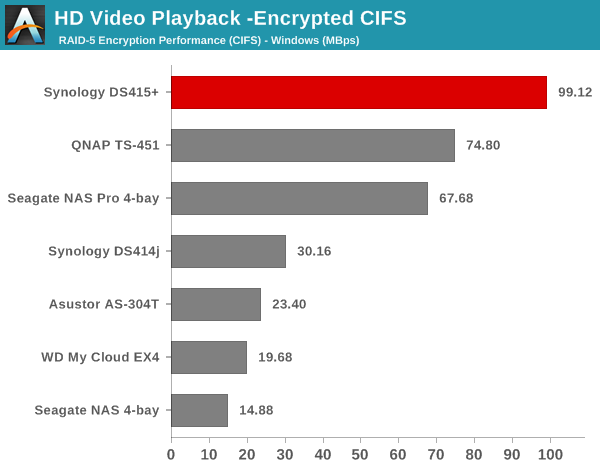
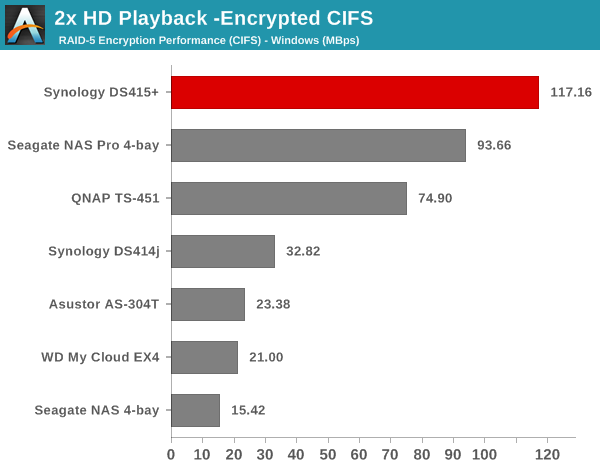
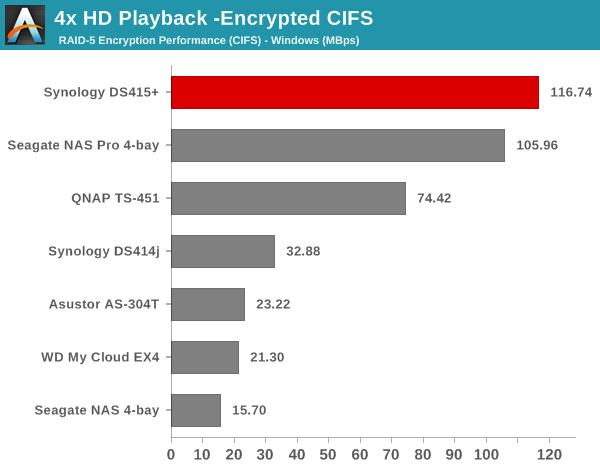
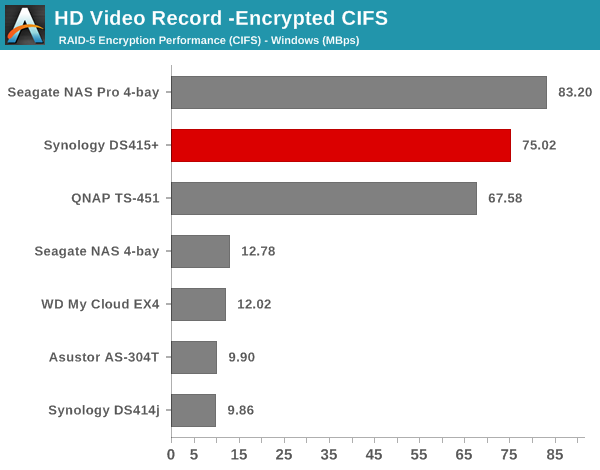
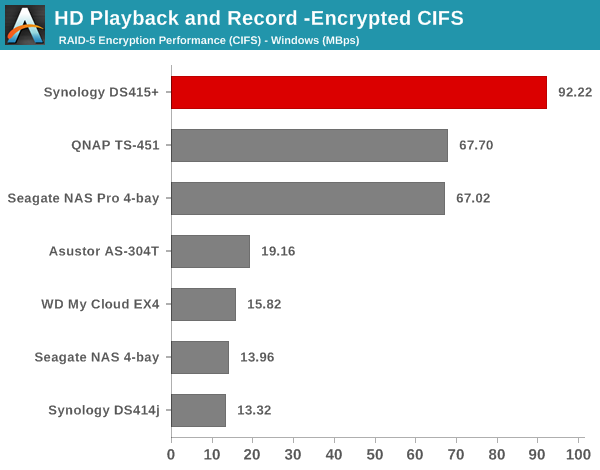
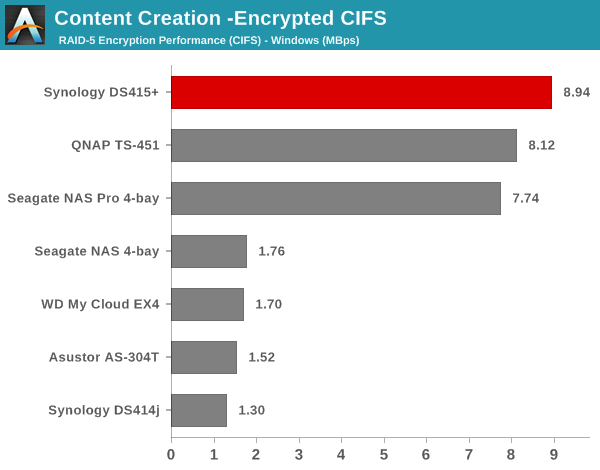
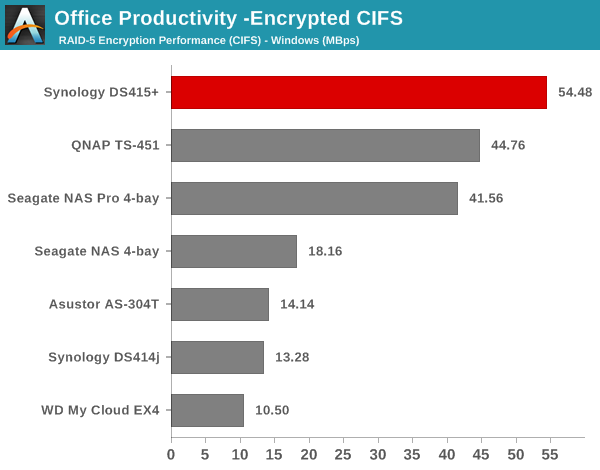
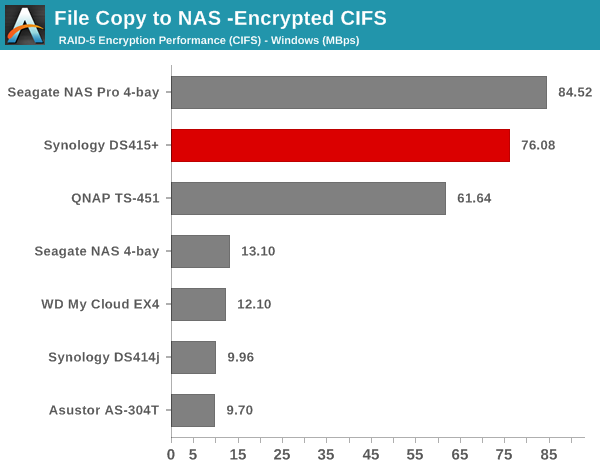
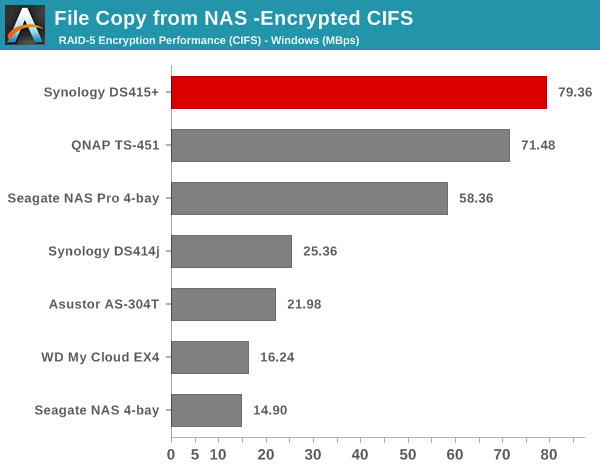
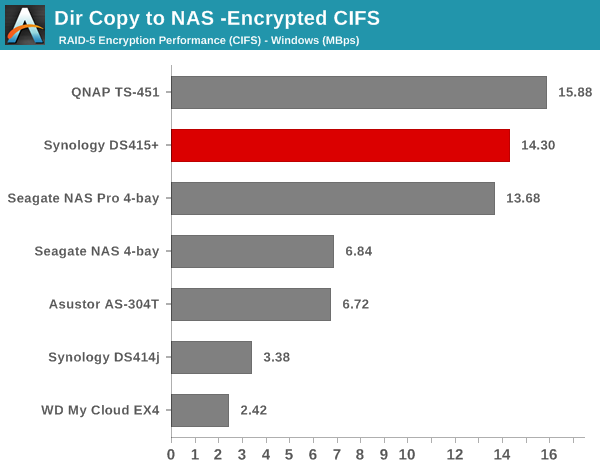
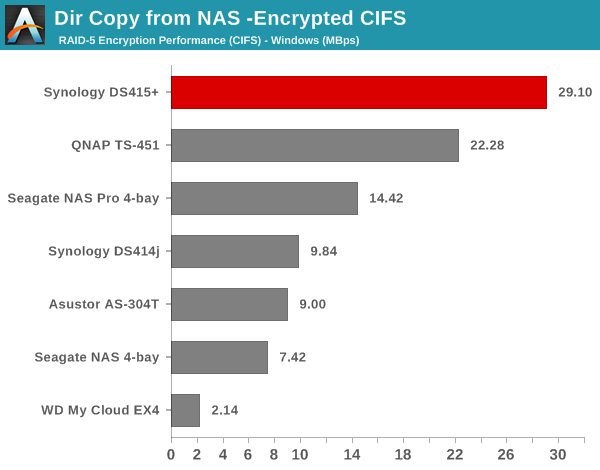
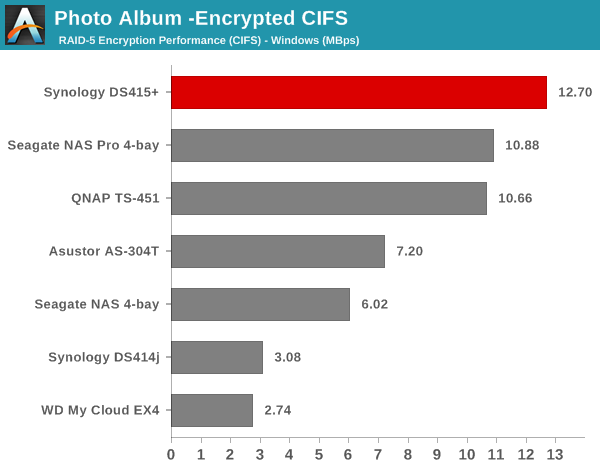
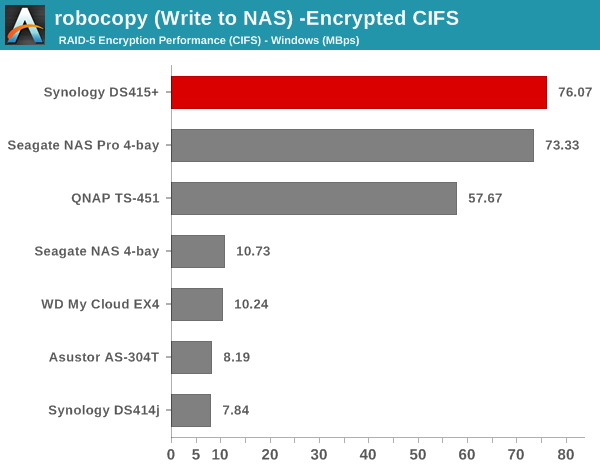
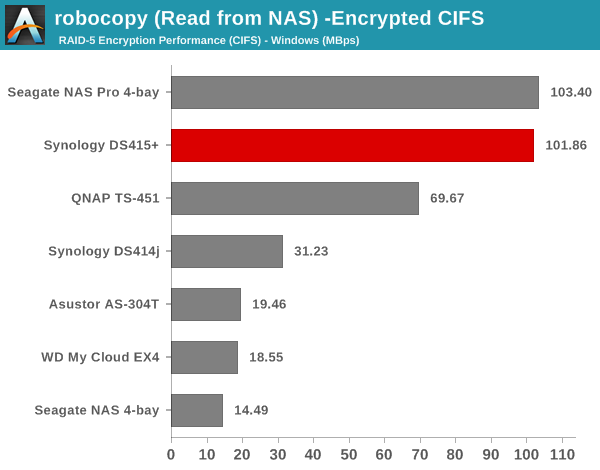
The write performance with encrypted shares could do with some improvement (for certain workload traces). Other than that, the higher clock for the SoC (compared to the Seagate NAS Pro) and the presence of AES-NI in the SoC (compared to its absence in the SoC used in the QNAP TS-451) enable the DS415+ to come out trumps in most of the above benchmarks.










41 Comments
View All Comments
naxeem - Thursday, October 30, 2014 - link
Play edition has significantly worse CPU and memory is half of the + edition. Not sure if Play is actually capable of performing adequately and + (as far as I know) can also stream through DS Video. The play edition fails at streaming DTS audio correctly so it is useless in that regard anyway.stbufraba - Sunday, November 2, 2014 - link
I was very disappointed by the DS414play´s lack of support for DTS audio and returned it for a DS415+. Why Anandtech recommends the DS414play is something I can´t understand.Dunkurs1987 - Monday, February 15, 2016 - link
You need to spend time and decide what this NAS really gonna be for- to not regret:http://www.span.com/compare/DS416J-vs-DS416-vs-DS4...
elithrar - Thursday, October 30, 2014 - link
Thanks for the review — I've been deliberating over the DS415+ and the DS415play for a few weeks. The big plus with the 415+ is the extra cores and RAM, which means it can 'brute force' transcode 1080p. The 415Play relies on software packages (i.e. not Plex) calling the extra hardware instructions.skarnm2 - Thursday, October 30, 2014 - link
One of my criticisms of all the reviews for these NAS product, is we are not getting an idea of the cpu potential of these new chips, beyond a bunch of disk transfer speeds.As was previously mentioned, you wouldn't go with DS415Play, since the application of it's transcoding hardware is solely limited to DS Video, which means if you want Plex, you need the power of the CPU.
So for instance, one of the features of Plex server is the ability to transcode media ready to be delivered to a tablet, to take away on a trip. So how much quicker is that being delivered, with these newer chips.
Lets look at expanding the reviews away from just disk transfer speeds, since these boxes do so much more than just serve up files.
adboelens - Friday, October 31, 2014 - link
I completely agree. I understand this particular unit is not aimed at home use, but it would be nice have an overview of what the different ranges of NAS processors are capable of. Right now all the reviews that I have read about these kind of units fail in this regard and an overview of the capabilities of these processors with different plugins for DSM V would be appreciated (disclaimer I'm a big fan of Plex, so I'm particularly interested in this feature).icrf - Thursday, October 30, 2014 - link
Has anyone seen a Rangely system designed for networking and not storage? I've been looking for a Silvermont-based mini-system to use for gigabit routing, something with a pair of good Intel NICs, and have come up short. The older Atom systems were bottlenecked well south of a gigabit of throughput.shelbystripes - Thursday, October 30, 2014 - link
No, but there are motherboards suitable for this. The SuperMicro A1SAi (Avoton)/A1SRi (Rangeley), ASUS P9A-I, and Gigabyte GA-9 series of motherboards all feature quad GigE off of the integrated i354 Ethernet controller (usually with a Marvell PHY). The high-end SuperMicro boards feature the 8-core C2750/C2758 CPUs, too, and use a passive heatsink (you'll want to make sure your chassis has some kind of internal air circulation). If you're prepared to roll your own, you could build one hell of a server that shouldn't be bottlenecked by the CPU.bobbozzo - Thursday, October 30, 2014 - link
The Sophos (nee Astaro) UTM appliance model SG115 has a Silvermont Atom CPU.The price (~$850USD) includes a 1-year unlimited license, but you can get a free home-user license limited to 50 internal IPs if you don't want to renew the license after 1 year.
See http://astaro.org for the user support forum.
BTW, I recommend buying from a real reseller rather than an online store, as the reseller can give basic sizing advice, etc., without extra charge.
Sonic01 - Thursday, October 30, 2014 - link
You haven't stated if you are using Link Aggregation, as the main new feature of this NAS is hardware encryption why do none of your tests top 100MB/s?I would expect to see figures close to the 220MB/s advertised on the Synology website?